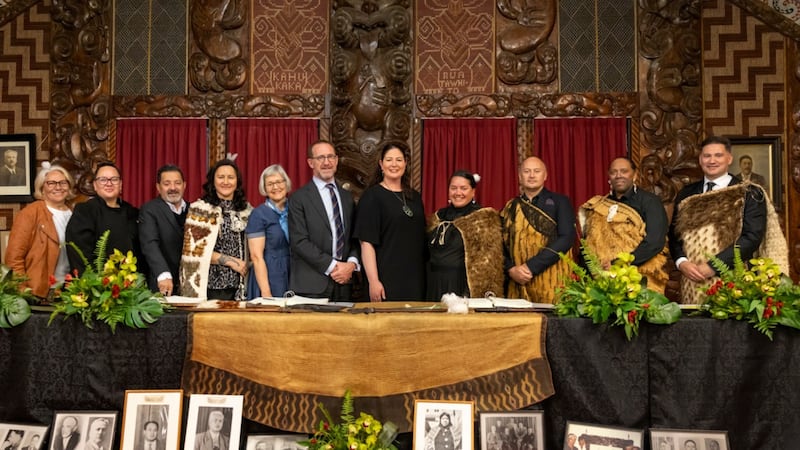The Taranaki maunga was confiscated in 1865 by the Crown as a punishment for the so-called rebellion of Māori during the New Zealand Wars.
Now a bill that will recognise the maunga as a legal person has just passed its first reading in Parliament.
Treaty of Waitangi Negotiations Minister Paul Goldsmith says this is honouring Taranaki iwi who have been pushing for this kaupapa for the past six years.
“This bill addresses the commitment the Crown made to the eight iwi of Taranaki to negotiate collective cultural redress over the maunga once all individual settlements were complete.
“The arrangements include the national park being renamed Te Papa-Kura-o-Taranaki, and the highest peak having its name changed to Taranaki Maunga,” he says.
This follows after hundreds gathered in September 2023, to see the Crown officially give up ownership of Taranaki Maunga.

They agreed to share managing the national park with the region’s eight iwi.
The plans involve acknowledging the legal entity, transferring the ownership of Egmont National Park land to Te Kāhui Tupua, acknowledging a set of principles to direct decision-making in the park, and forming a group to represent the legal entity.
Te Pāti Māori co-leader Debbie Ngarewa-Packer (Ngāti Ruanui, Ngāruahine and Ngā Rauru) says this bill legally recognises the Taranaki maunga, its nearby mountains, and lands, now known as Te Kāhui Tupua.
“Today is a testament to the art of our resistance as kaitiaki. It is also a testament to the generosity of tangata whenua, who have given up so much and accepted so little in return in the name of peace and reconciliation.
“This is the first Treaty settlement bill to be progressed by this government, and it is the first time they have showed any form of goodwill toward tangata whenua,” she says.

This was a rare occasion with all parties in Parliament welcoming the bill.
Labour’s Willie Jackson said he couldn’t believe what he was witnessing during the proceedings as it gave a sense of unity between the previous government and this one.
“I was having a bit of a kōrero with my old friend over here, [former Labour MP] Mahara Okeroa, and he said to me - he didn’t want me to say it. I’m breaching our confidence. ”Is everyone supporting this waka katoa [all of them]?” I said, “You wouldn’t believe it, would you, Mahara. You just wouldn’t believe it.”
What’s next?
After a bill’s first reading in the New Zealand Parliament, it is referred to a select committee for detailed examination.
The select committee considers the bill clause by clause and may invite public submissions.
Following this, the committee reports back to Parliament with any recommended changes and a second reading may proceed if agreed by the government.


